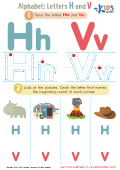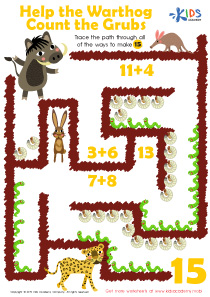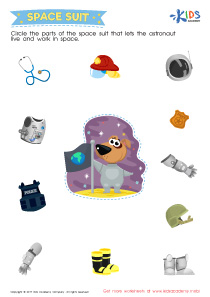Number Stories - 1 Less Quizzes for Ages 4-5
3 results
3 filtered results
Clear all filters3 filtered results
-
From - To
Number Stories - 1 Less Interactive Assessment Quizzes for Ages 4-5
Dive into the world of numbers with our "Number Stories - 1 Less" interactive assessment quizzes, specially designed for children aged 4 to 5. Through engaging number stories, these quizzes offer a fun and interactive way to understand and apply the concept of '1 less'. Each quiz not only checks your child's knowledge but also provides immediate feedback to enhance learning. Perfect for young learners, our quizzes make mastering the basics of subtraction and number relationships both enjoyable and rewarding. Embark on this numeric adventure and watch your child's numeracy skills flourish!
Interactive quizzes on Number Stories - 1 Less for Ages 4-5 are an essential tool in the educational journey of young learners. These quizzes are designed with the developmental stage of children in mind, offering a blend of learning and fun that is crucial for keeping the attention of kids in this age group. Engaging, interactive, and educational, these quizzes lay a solid foundation in mathematics, particularly in understanding the concept of subtraction and numbers.
The journey into the world of numbers can be daunting for young minds, but with Number Stories - 1 Less for Ages 4-5, children are introduced to these concepts in a manner that is both enjoyable and manageable. The strength of these quizzes lies in their ability to tell stories with numbers, transforming abstract concepts into tangible narratives that children can understand and relate to. This storytelling approach is fundamental in helping children grasp the ‘1 less’ concept, making learning a natural and enjoyable process.
Moreover, interactive quizzes provide immediate feedback, a key component in the learning process for children aged 4-5. When a child answers a question correctly, the positive reinforcement encourages them to continue engaging with the material. Conversely, incorrect answers become learning moments, not through criticism but through encouragement and explanation. This instant feedback mechanism ensures that learning is continuous and interactive, keeping children motivated and engaged.
The design of these quizzes also takes into account the attention span and cognitive skills of children in the 4-5 age group. The activities are short enough to keep their attention but challenging enough to stimulate their thinking. Additionally, these quizzes are designed to be user-friendly, allowing children to navigate them with minimal assistance. This fosters a sense of independence and self-confidence in their learning abilities, which is crucial for their overall development.
Another significant benefit of Number Stories - 1 Less for Ages 4-5 is the way they incorporate visual learning. Children at this age are highly visual learners, and the colorful, engaging imagery used in these quizzes helps solidify the concepts in their minds. By associating numbers and the concept of ‘1 less’ with specific visual stories, children are more likely to remember and understand the material.
Furthermore, these quizzes are designed to be inclusive and accessible, ensuring that every child, regardless of their learning pace, can benefit from them. They offer various levels of difficulty within the concept of ‘1 less,’ ensuring that all children, from those just beginning to explore numbers to those ready for more challenging material, find the quizzes both stimulating and rewarding.
In conclusion, the interactive quizzes on Number Stories - 1 Less for Ages 4-5 are an indispensable resource in the early educational journey of children. They provide a unique blend of learning, fun, and developmentally appropriate content that is key to fostering a love for numbers and an understanding of basic mathematical concepts. By engaging with these quizzes, children not only learn about ‘1 less’ but also develop critical thinking, enhance their problem-solving skills, and build a strong foundation for their future academic journey.













